16 February 2023
![]() 11 mins Read
11 mins Read
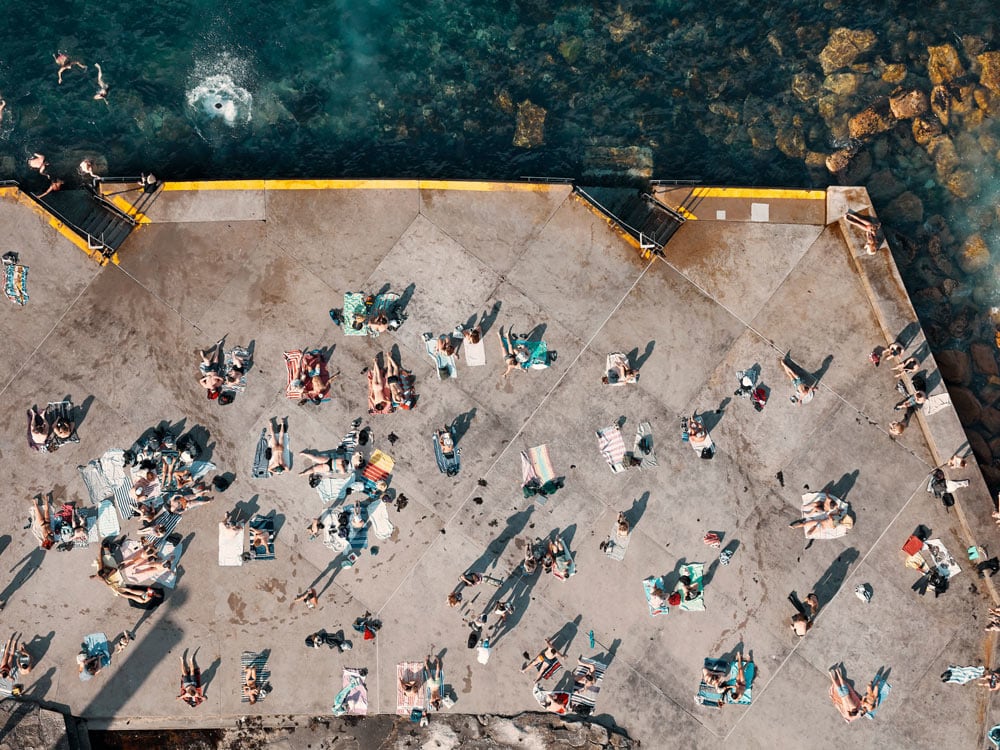
I’ve spent nearly two decades listening to Australians talk about themselves: who we are, who we have been and what we are becoming. The shifts, evolutions and the persistent traits in our national identity. When sitting in focus groups of friends or strangers, our thoughts spiked with caffeine, sugar or alcohol, and given the time and space to contemplate, we are often able to draw out our collective complexities and contradictions, to be honest about them and to try to make sense of them.
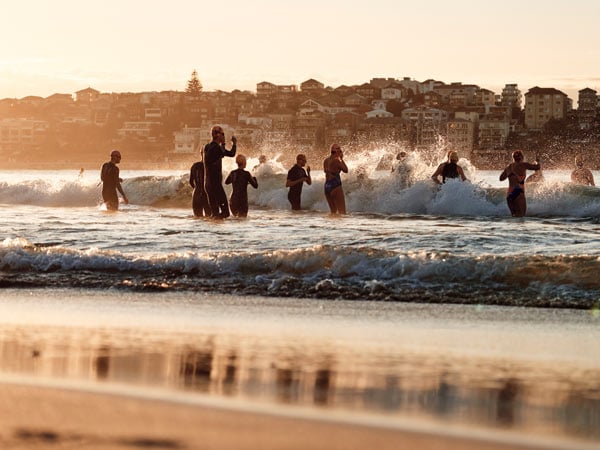
Saltwater is in our DNA as these swimmers heading out into the ocean off Bondi Beach can attest. (Image: DNSW)
Are we hardworking or laid-back? Rule breakers or rule followers? Are we the most successful multicultural nation on Earth or xenophobic and intolerant? Are we innovative, creative and flexible? Or are we hopelessly set in our ways, resisting change even if it hampers or harms us? Are we a sophisticated nation of enthusiastic travellers and engaged global citizens? Or are we insular and inward looking, concerned with coming first in the Olympic swimming medal tally and little else?
In my own work as a social researcher, I have changed my mind about many of these questions over time, and for me they remain mostly unresolved. Which might be that our national character is one of contradictions or constant evolution. Or maybe I am the one who’s changing? Australians recognise that we are good at telling ourselves a positive story about who we are that doesn’t always stand up to scrutiny, or blaming others for our national flaws, more often than not politicians.
That being said, most of us know it’s hard to stand outside yourself and see what others do. Over my time as a researcher, I have often found that the most perceptive insights about Australia and Australians come from new arrivals, not so much tourists as migrants who live and work here. One of the most insightful comments came from a Sudanese refugee, a middle-aged man, who was being interviewed as part of a project I was conducting for a media company. He was a big fan of the TV soap Home & Away, mainly because it helped him learn English. The plot lines and character development, however, were somewhat bewildering to him. “Why are these blonde, good-looking rich people who live by the sea so unhappy?” he asked me in earnest.
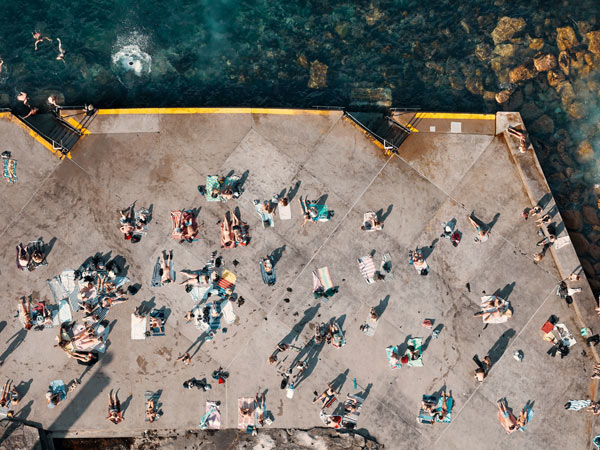
Socially distanced sun-seekers near Clovelly Beach. (Image: Tourism Australia)
It’s a bloody good question. And if I reflect on 20-plus years of listening to Australians, the big theme that emerges is ‘anxiety’. We live in a prosperous, peaceful, beautiful country, tucked far away from much of the world’s conflict zones. Our anxieties are both economic and cultural and sometimes a heady mix of the two. Why is housing so expensive and why can’t anyone seem to do anything about it? Where are the jobs of the future coming from? Why don’t we make things in this country anymore? Why is our politics broken? Who is going to care for me as I get older? And while we can wax lyrical about the kinds of behaviour that we consider ‘un-Australian’ (for example, private beaches), we are constantly questioning which other, bigger country we should take our cues from: America; England; China?
So when a fair dinkum anxiety-inducing event happens, how do we respond? I write this as we exit a harsh set of lockdowns that has turned our nation into a cluster of competing provinces, divided by state and territory lines, almost a throw back to the time before Federation. A time of immense change globally and across the country that has exposed some of the fault lines in our society and our economy.
If it wasn’t such a stressful time, it would be the best possible time for a social researcher to be alive, to observe how we have responded to overlapping and intersecting crises. Crisis brings out the best and the worst in us all and as a nation how we respond to crisis should be the ultimate verdict on our national character, a way to prove all those competing theories and resolve some of the questions I have posed.
If we look at the social research on how Australians think we have handled COVID-19, we get a glimpse of a country that is community minded, obedient but also at times complacent. Our initial response to the pandemic was collaborative and civil – ‘We are all in this together! We’ll get through it if we follow basic rules, master Zoom and get a bit of help by way of government subsidies.’
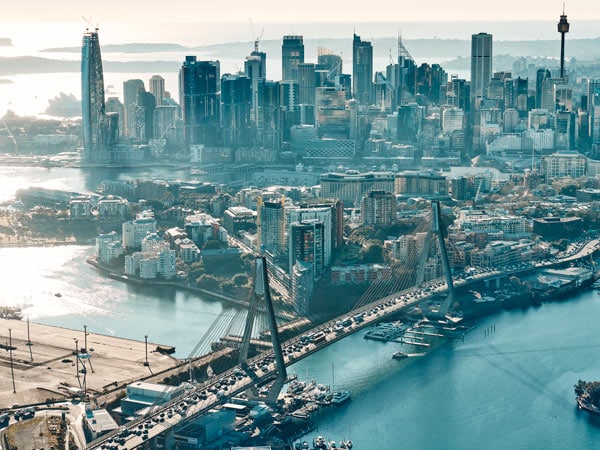
The Sydney CBD was devoid of people during the pandemic. (Image: DNSW)
The first wave was tough going, especially for Victorians, but without the death tolls and public protests of other countries. There was much backslapping all around. The American-based Pew Research Center found in 2020 that Australians ranked second, globally, after the Danes, in terms of their approval of how their government managed the crisis. We entered a period of social distancing and masks but also of life slowly returning to some kind of normal.
The lull in the pandemic lasted months and while there was a lot of discussion around vaccination, there was not much urgency. It was like after ‘all hands-on deck’, it was down tools, sit back and wait. Then Delta arrived with a new wave of lockdowns, harder than the first, and second in the case of Melbourne. In the end, despite our early best efforts, our response to COVID-19 exposed some of the worrying tendencies in our leaders and our nation more broadly.
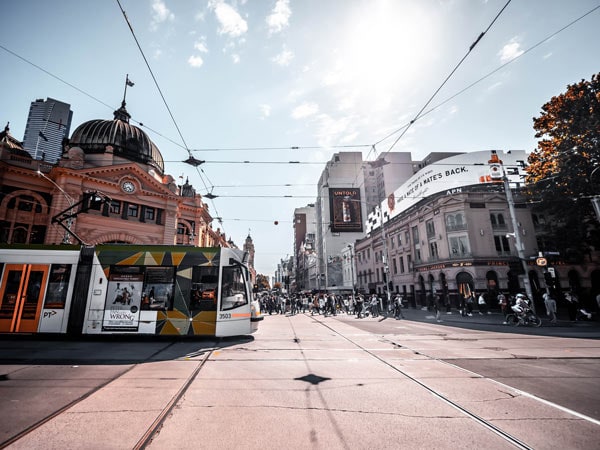
Crowds of Melburnians at a crossroads near Flinders Street Station.
We acted reactively rather than proactively to a crisis that was predicted by experts, with a combination of good fortune, community effort and ‘she’ll be right mate’ pulling us through at the end. As I write this we are on track to join countries like Spain, Portugal and Singapore at the top of the global vaccination rankings.
Maybe that, in itself, is a reflection of our collective resilience, especially given the fact that before COVID-19 arrived our nation had already been hobbled and scarred by the Black Summer fires. They destroyed thousands of homes, killed 33 people and more than a billion animals. The armed forces were required to evacuate thousands; the biggest peacetime evacuation in our history. An astonishing 17 million hectares of land burned. We are used to international acclaim from the Hemsworths and our quirky marsupials, but those fires also made us world famous. The smoke reached across the ditch to New Zealand. Images of injured koalas and exhausted firefighters filled the global media. It created an algal bloom bigger than our own land mass in the Southern Ocean.
Again, this was an unprecedented event, but, again, not totally unpredicted. While the nation pulled together to support each other through the fires, those who understand issues around climate change lamented the lack of long-term planning and the approach of our leaders to protecting the environment. The good news is that most of us felt the same way. Research undertaken by the agency Fiftyfive5 found that 66 per cent of Australians are more concerned about climate change since the Black Summer fires, and that concern has remained largely stable through the pandemic.
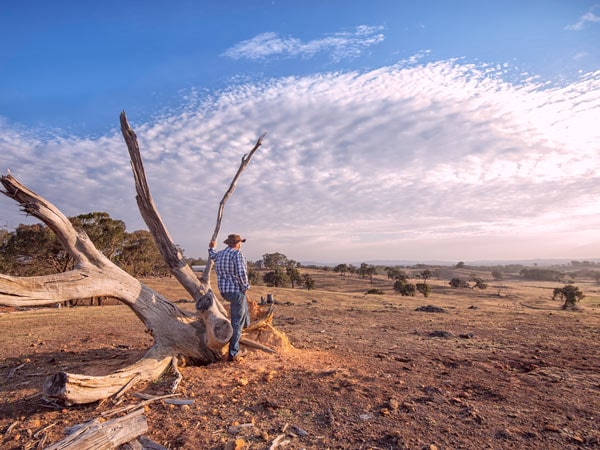
A farmer surveys the sprawling Australian outback under a sky curdled with clouds.
In the social research I do, Australians recognise that we need to continue to invest in a healthier and more sustainable world after the pandemic wanes. That speaks to a measure of determination, identifying the fact that we need to manage this crisis now, and accepting there will be more work to be done in the future.
For a country that ranks as one of the happiest in the world, I’ve noticed that lockdown has allowed us to discover a new joy in being outdoors and in nature, fostering an appreciation of our local green spaces and our unique natural environments that has also deepened our understanding of what we need to do to protect them.
Many of us know we are lagging in our uptake of renewable energy and approach to climate change and want to believe in a vision of an Australia that can become a renewable energy super power, that can make things again, and that isn’t just reliant on digging stuff up and shipping it off to other countries for economic prosperity. We are beginning to understand what is at stake if we don’t protect our climate – our incredible natural landscape, our native flora and fauna, our World Heritage sites, not to mention our waterfront properties and playgrounds. All things we love, value and want to preserve.
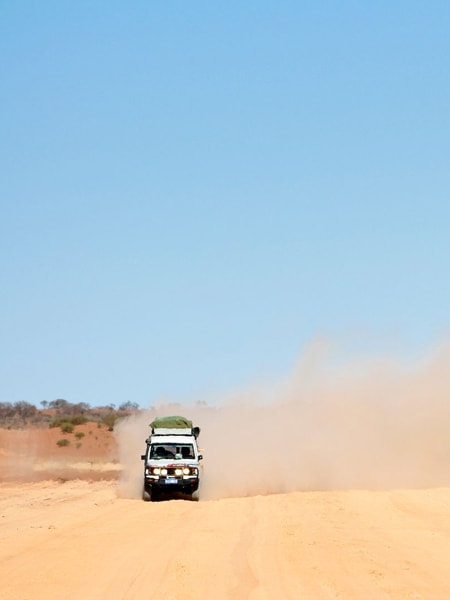
From beach to bush to outback, lockdown has given us a renewed appreciation for being outdoors.
The question, of course, is are we ambitious, confident and determined enough to make up for lost time? Or more importantly, are we prepared to vote for leaders who are? I believe, somewhat naïvely, that we can recognise the right leaders when it really matters (and when presented with them at the ballot), and that we like them to talk about ambitious plans (as long as we can think it over for a while before getting on with it in earnest).
Speaking of the next 10 years, what does the future hold for a country that sometimes wrestles with its own self-worth, its ambivalence about its strengths and its place in the world? That seems caught between a desire to be optimistic and happy and concerns about the future, the calibre of our leaders and our collective ability to think long-term and be more ambitious?
A country that knows how to pull together for the common good, but often struggles with the details of how best to plan for a common future. We’ve often been described as the lucky country, but also one that coasts by on luck alone.
I’ve discovered that Australians agree with both definitions. That we are lucky, and that luck can make us lazy. Our leaders know this and it makes them lazy, deferring making bold decisions that will help prepare for a more challenging – and rewarding – future, and relying on community spirit and the rule-following nature of the Australian public to get things done.
Time and again I’ve seen the public rise above the low horizons of our elected representatives. One of our saving graces is that when we figure out we need to do something, we act quickly and effectively. We make up for lost time by moving towards renewable energy. We get everyone vaccinated quickly, with a minimum of shouting in the streets. We send in a postal ballot to make same-sex marriage legal. More and more it’s the community leading the leaders, not the other way around. This is heartening. What we need is more of these community members stepping their way into the halls of power.
So, how can I answer the question posed by that Home & Away fan newly arrived from Sudan? Why do all these wealthy people who live by the sea seem so unhappy at times?
Australians know we live in a rich, beautiful and secure country. The depth of our appreciation for that fuels our concerns that such bounty and good fortune is at risk of slipping away. We rank high on happiness, but low on confidence.
I’m a proud Australian but I also want something that might be viewed as slightly un-Australian: I want more. More for my kids, for my community and for my country. I want more than muddling through a crisis when it presents itself or settling for leaders who don’t reflect our common goals. I want to rely on more than community spirit and natural resources to help us prosper. I want to build something more substantial, something more sustainable that builds on our amazing inheritance, and I suspect the majority of Australians do, too. Because at our core we are a nation that is willing to strive, to work hard, to contribute to the greater good and to want to do better. Then we really can say we are more than just lucky; we will be worthy of that luck.
Very much a political comment. Not really what is expected from Australian Traveller!! If you are that interested in politics, get involved yourself.
We have just crawled out of Covid Madness to end up being one of the top 5 Vaccinated Nations in the World, but this article reflecting what some Sudanese guy’s impression of Home and Away was I find truly melancholy. Lighten up ! What’s Australia like ? – Rachel, try listening to ‘Macca on a Sunday morning’ and you’ll find it full of interesting, involved people from all walks of Life living the dream. Low on confidence ? that just seems to fit in with a self loathing viewpoint ‘ some ‘ Lweft leaning Aussies like pontificating on. There are millions of people in the outer suburbs and regions who quite like Australia, nothing is perfect but they would not want to live anywhere else.
WOW! This is powerful -and brilliantly written. I am so relieved to read back my own thoughts, prides, frustrations and fears expressed so articulately by someone with the knowledge and research to back it up. Huge congratulations Rebecca. Let’s hope that Australians can collectively get moving and get this happening. Back to manufacturing, buying Australian and coming up with the best possible energy solutions for us (and the planet).
Carolyn
Carolyn
As a migrant of 50 years ago and eventually proud Australian citizen I cannot agree with you more. It makes me sad that when it comes to choose our leaders, many of my fellow Australians vote for security in the here and now rather than for bold visions in the future (one example is our superannuation system that was long overdue when it came in and needs to be upgraded). Can you please make sure that politicians in the Labour party read your article. They attempted to be visionary last time, but now seem to be very timid. I believe the population may just about be ready to embrace solid, fact-based ideas that catapult Australia out of the digging and selling mentality into an exciting, creative space….with a little help and support from the government.
These reflections on research and natural disasters share little research or reflection on the core beliefs of our citizens, their attitudes to religion and other key values that shape the fabric of a society. I would have liked to see more about who we are, deeper, in our hearts, and what we want for our children from a moral and spiritual perspective. What are the ground rules for the future and what can we draw from the diverse cultural mix that makes up our population. There is much to learn and share.
Such a good read, so many poignant, relatable insights. “I want more. More for my kids, for my community and for my country.” I heard this very sentiment lamented by many 30-something Aussie expats living in Singapore when I there. We had the example of their benign dictatorship and 20 year national master plan, accessible to its people. Very reassuring. They already had a purpose built air-borne pandemic hospital, as an example, which alone reduced people’s anxiety enormously when Covid hit …
This piece really highlights how lucky we are to call Australia home (love the Home and Away reflection) with a few solid tweaks we could really soar